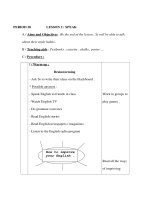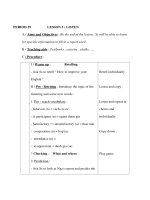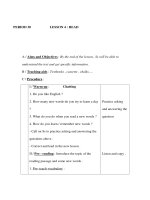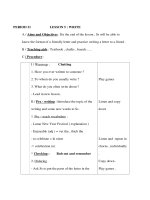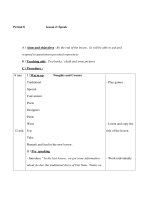Giáo án Anh văn lớp 9 - Unit 5 - Period 36 - The first semester test docx
Bạn đang xem bản rút gọn của tài liệu. Xem và tải ngay bản đầy đủ của tài liệu tại đây (18.69 KB, 5 trang )
Period 36 The first semester test
A / Aims and Objectives : Students can summarize their knowledge and fill their
gaps
B / Teaching aids : Paper sheet , chalks , boards .
C / Procedure :
- Deliver the paper sheets to students .
I / Supply the correct tense form of the verbs : ( 2,0 p )
1. I ( not see ) your brother recently .
No , He ( not be ) out of his room since he ( buy ) a new computer .
2. When I ( come ) to see Mr Robinson last night , he ( read ) a newspaper and his
two children ( listen ) to an English song .
3. We prefer ( watch ) TV to ( read ) books .
4. The boys like ( play ) games , but hate ( do ) lessons .
II / Rewrite these sentences with the words given : ( 2,5 p )
1. They produced the first TV in 1926 .
=> The first TV …………………
2. They grow coffee in Vietnam .
=> Coffee ………………
3. “ Do you like English ? “
=> John asked ………………………
4. “ How many students are there in your class? “
=> Lan asked ………………………
5. What a pity ! I can not go out with you tonight .
=> I wish ………………………
III / Choose the best options to complete theses sentences : ( 2,0 p )
1. The ( nature / natural / culture / cultural ) of Vietnam is like that of China .
2. The Brighton Language has excellent ( well-qualified/reputation /famous /
scenery )
3. What subjects are you good ( on / in / about / at ) in the 9
th
form ?
4. Today Jeans are ( famous / popular / traditional / wide ) all over the world .
5. Bahasa Malaysia is the primary language of ( instruction / education / religion /
foreigner ) in the secondary school .
6. This cake can be ( divided / decided / separated / abroad ) into many pieces .
7. My friend and I ( corresponds / correspond / correspondence / corresponded ) at
least twice a month .
8. Some designers have taken ( invitation / invention / suggestion / inspiration )
from Vietnam
,
s ethinic minorities .
IV / Complete this passage and answer the questions below : ( 2,5 p )
Slowly - hear - invented - specialists
Easily - children - change - English
Like other languages , … (1)…… is always changing , but it changes very
…(1)… People invent new words , borrow words from other languages , and (3)
… the meaning of words as needed . For example , the English words “ byte “ was
…(4) by computer ….(5) in 1959 . The word “ tomato” was borrowed from
Nahuatle an American Indian language spoken in Mexico . The word “ meat “
once referred to food in general . People learn English as well as languages by
listening , copying what they ….(6)…, and using the language . Most school
… (7)…. learn their first language … (8)……. and sometimes other languages as
well .
1. How does English change ?
2. Which word was invented in 1959 ?
V / Listening : ( 1,5 p )
Listen to the talk between Lan and Ba about the differences between her life in
the city and in her home village. Circle the best option .
1. Lan is sad because she ………… her home village .
a. miss b. missed c. misses d. missing
2. Now Lan lives in ………………….
a. a village b. a small village c. a city d. the country
3. Hre home village ……………… A beautiful place .
a. was b. used to c. are d. is
4. She thinks people in the city are ………… people in the village .
a. not as friendly as b. less friendly than
c. as friendly as d. more friendly than
5. She thinks living in big cities …………… very expensive .
a. were b. are c. was d. is
6. The price of renting apartments are ………………
a. cheap b. expensive c. high d. so high
* Tapescript :
Ba : You look so bad , Lan . What is the matter ?
Lan : I am sad . I miss my home village .
Ba : You do . So tell me about it . What is it like ?
Lan : It is a pretty village on a small river in Ha Tay . It has great scenery , lots of
green fields , lakes , trees and mountains .
Ba : It sounds like a lovely place . What about the people ? What are they like ?
Lan : Well , The villagers are very friendly . They are much friendlier than city
people
Ba : I see . How are the prices ? Is it expensive there ?
Lan : No . It is fairly cheap . Big cities are more expensive to live in . Food costs a
lot , both in the supermarket and in restaurants . And apartments ! the rents are
so high .
Answer key :
I / ( 2,0 p )
1. have not seen – has not been / bought 2. came – was reading / were listening
3. watching / reading 4. playing – doing
II / ( 2,5 p )
1. The first TV was produced in 1926. 2. Coffee is grown in Vietnam .
3. John asked me if I liked English . 4. Lan asked how many students there
were in my class. 5. I wish I could go out with you
tonight .
III / (2,0 p)
1. culture 2. reputation 3. at 4. popular 5. instruction 6. divided 7.
correspond 8. inspiration
IV / ( 2,5 p )*Fill in each gap with a suitable
1. English 2. slowly 3. change 4. invented
5. specialists 6. hear 7. children 8. easily
* Answer the questions
1. It changes very slowly . 2. It was “ byte “ .
V / Listening (1,5 p ): 1. c 2. c 3.d 4.a 5.d 6. d
the second semester
